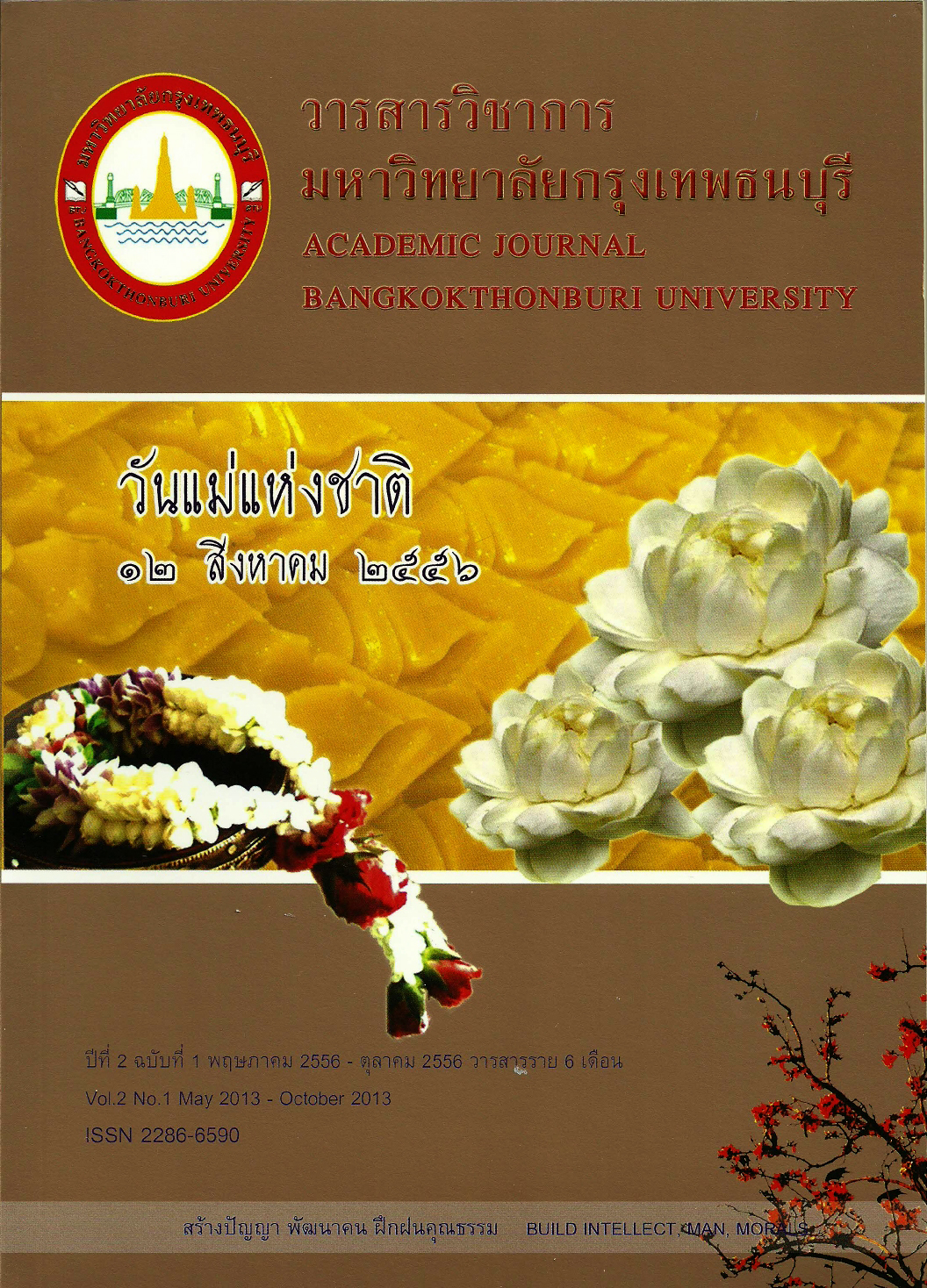บทบาทของสถาบันการเงินตามมาตรฐานสากลด้านการป้องกัน และปราบปรามการฟอกเงิน : ศึกษาหลักเกณฑ์การรู้จักลูกค้า และการตรวจสอบข้อเท็จจริงของลูกค้าสถาบันการเงิน
Main Article Content
Abstract
สืบเนื่องจากที่ประเทศไทยมีความจำเป็นต้องเร่งดำเนินการแก้ไขปรับปรุงมาตรการด้านการป้องกัน และปราบปรามการฟอกเงินเพื่อให้เกิดความสอดคล้องกับมาตรฐานสากลด้านการป้องกันปราบปรามการ ฟอกเงินและการต่อต้านการสนับสนุนทางการเงินแก่การก่อการร้าย โดยเฉพาะในข้อที่เกี่ยวกับการตรวจ สอบเพื่อทราบข้อเท็จจริงเกี่ยวกับลูกค้า (Customer Due Diligence : CDD) ของสถาบันการเงินตามกฎ กระทรวงกำหนดหลักเกณฑ์และวิธีการตรวจสอบเพื่อทราบข้อเท็จจริงเกี่ยวกับลูกค้า พ.ศ.2555 กล่าวคือ สถาบันการเงินและผู้ประกอบอาชีพ ตามมาตรา 16 (1) (9) มีหน้าที่ต้องกำหนดนโยบายการรับลูกค้า การ บริหารความเสี่ยงที่อาจเกี่ยวกับการฟอกเงินของลูกค้าและต้องดำเนินการตรวจสอบเพื่อทราบข้อเท็จจริง เกี่ยวกับลูกค้า เมื่อเริ่มต้นทำธุรกรรมครั้งแรกโดยต้องตรวจสอบเป็นระยะจนสิ้นสุดการดำเนินการเมื่อมีการ ปิดบัญชีหรือยุติความสัมพันธ์กับลูกค้า
จากการศึกษาพบว่า ปัญหาที่เกิดขึ้นจากการบังคับใช้มาตรการดังกล่าวมีสาเหตุมาจากการขาด แนวทางในการปฏิบัติเกี่ยวกับการตรวจสอบเพื่อทราบข้อเท็จจริงเกี่ยวกับลูกค้า และการขาดประกาศซึ่งออก ตามกฎกระทรวงฉบับดังกล่าว ทำให้การบังคับใช้มาตรการดังกล่าวกับสถาบันการเงินและและผู้ประกอบ อาชีพตามมาตรา 16 (1) (9) ไม่สามารถกระทำได้อย่างเต็มที่
ดังนั้น เพื่อให้เกิดประสิทธิภาพในการบังคับใช้มาตรการและหลักเกณฑ์การรู้จักลูกค้าและการ ตรวจสอบข้อเท็จจริงของลูกค้าสถาบันการเงิน จึงได้เสนอแนวทางให้สำนักงานป้องกันและปราบปรามการ ฟอกเงินในฐานะหน่วยงานบังคับใช้กฎหมายโดยตรง จะต้องกำหนดแนวทางปฏิบัติเกี่ยวกับการตรวจสอบ เพื่อทราบข้อเท็จจริงเกี่ยวกับลูกค้าของสำนักงานป้องกันและปราบปรามการฟอกเงิน เพื่อกำหนดหน้าที่และ ความรับผิดชอบในการปฏิบัติตามนโยบายของสถาบันการเงินและผู้ประกอบอาชีพตามมาตรา 16 (1) (9) และเร่งดำเนินการออกประกาศที่เกี่ยวข้องตามกฎกระทรวงเพื่อกำหนดหลักเกณฑ์และวิธีการตรวจสอบ เพื่อทราบข้อเท็จจริงเกี่ยวกับลูกค้า ทั้งนี้เพื่อให้เกิดประสิทธิผลในการป้องกันและปราบปรามการฟอกเงิน ในสถาบันการเงินอย่างสูงสุด
The Roles of Financial Institution in Anti-Money Laundering Law
on Know Your Customers and Customers Due Diligence
Thailand is required to urgently improve the measures on anti-money laundering in order to comply with the International Standards on Combating Money Laundering and the Financing of Terrorism, especially with the subject concerning about customer due diligence (CDD) duties of financial institutions under the Ministerial Regulation Prescribing Rules and Methods of Customer Due Diligence B.E. 2555, that is to say: financial institutions and professions, under Section 16 paragraph one (1) and (9) of Anti-Money Laundering Act B.E. 2542, shall have duties to stipulate a policy for customer acceptance and management of risk of possible connection with money laundering of a customer, and must conduct customer due diligence at the beginning of the first transaction, which must be periodically reviewed until the account is closed or relationship with its customer terminates.
The study finds that problems arising from imposition of the said measures caused by lack of practical direction concerning the conduct of customer due diligence and lack of absence of announcement, which would be issued by virtue of the said Ministerial Regulation, preventing the imposition of such measures upon the financial institutions and professions under Section 16 paragraph one (1) and (9) from being fully practiced.
For achieving efficiency in the imposition of measures and rules on “know your customer” and customer due diligence on financial institutions, thus, researcher suggests that Anti-Money Laundering Office, as the primary law enforcement authority, should determine a practical direction concerning customer due diligence of Anti-Money Laundering Office, in order to prescribe duties and obligations to implement policies of the financial institutions and professions under Section 16 paragraph one (1) and (9), and expedite issuance of relevant announcements under the Ministerial Regulation Prescribing Rules and Methods of Customer Due Diligence, therefore, in order that the financial institutions in preventing and suppressing money laundering.


